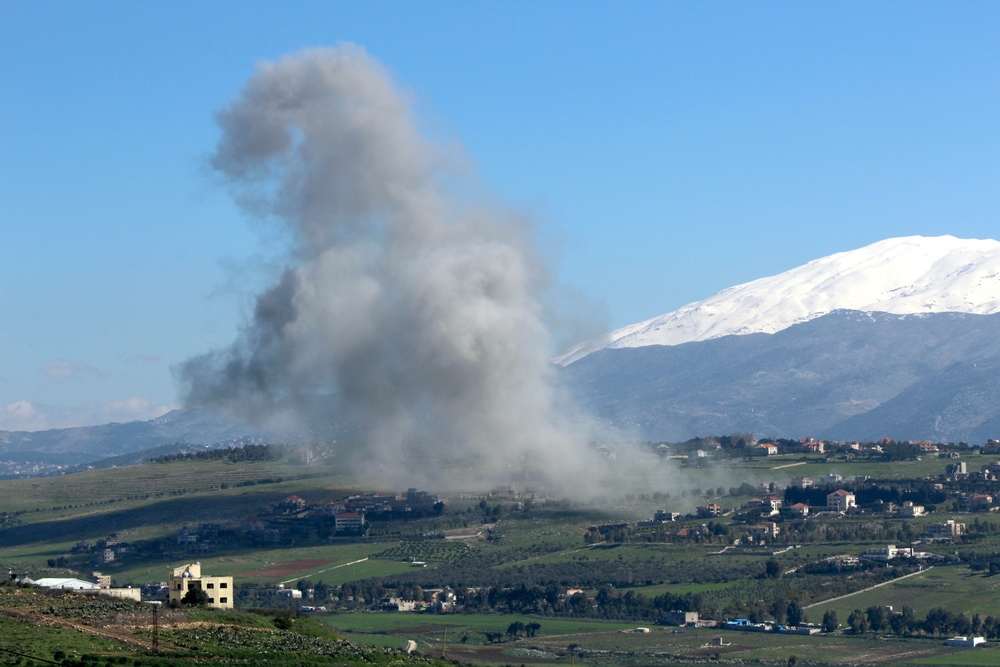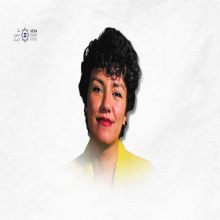November 18, 2024

Smoke rises following the Israeli strike targeted in the Khaim town in Nabatieh Governorate 21 February 2024 © ramiz dallah, licensed under Shutterstock.
In light of the recent and alarming escalation of indiscriminate and widespread Israeli attacks across Lebanon, we, the undersigned organizations, call on the international community to unequivocally press for an immediate ceasefire in Lebanon.
Israel and Hezbollah have been exchanging cross-border fire since October 2023. For nearly a year, the fighting between the two parties was mostly contained to the border regions of Lebanon and Israel. However, as of mid-September 2024, Israel has significantly escalated its attacks in Lebanon, destroying civilian infrastructure and killing scores of civilians across the country. Since September 23, over 2,600 people—mostly civilians—have been killed in Lebanon, one quarter of the country is under evacuation orders, and over 1.2 million have been forcibly displaced, including over 460,000 Lebanese and Syrians who have crossed the border into Syria. Syria is still not safe for the return of Syrian refugees, and dozens of returnees have been arrested upon crossing the border, with many others in danger of future arrest and persecution.
On September 17, Israel escalated its war on Lebanon with the indiscriminate pager and walkie-talkie attacks, whereby Israel booby-trapped thousands of devices, killing 32 people, including two children, and maiming or injuring over 3,000. The attacks caused widespread terror as the devices simultaneously exploded mid-day in civilian areas, such as grocery stores, on public streets, and during a public funeral. According to Human Rights Watch and Amnesty, the attacks are prohibited under international humanitarian law, and Amnesty has called for the attacks to be investigated as war crimes.
Soon after, Israel began implementing a policy of collective punishment by bombing and leveling entire apartment blocks, especially in the southern suburbs of Beirut, South Lebanon and the Bekaa valley, killing scores of civilians and destroying civilian infrastructure such as hospitals and roads, as well as vast agricultural land. In addition, the Israeli military has systematically used detonations to destroy buildings in numerous southern Lebanese villages—one report states that almost one fourth of houses in 25 municipalities have been destroyed, including mosques. Human Rights Watch found that Israel has also used airburst white phosphorus in populated residential areas of South Lebanon, injuring almost 200 people since October 2023. The use of white phosphorus in populated areas is prohibited under international humanitarian law for the indiscriminate harm it can cause through spreading smoke and fires, thereby failing to distinguish between civilians and combatants.
Even those displaced have been targeted all over Lebanon in places where they sought refuge. On October 15, Israel conducted an airstrike on a four-story building, killing 22 people from the same family, including two children and 12 women, after they had been displaced from South Lebanon and took up shelter in the Christian Maronite village of Aitou, in the far north of Lebanon. These attacks have amounted to massacres of displaced families and those providing them with shelter, feeding distrust amongst civilians that could sow sectarian tensions and push Lebanon into civil unrest.
Israel has also attacked protected persons in Lebanon, including health workers, emergency responders, UNIFIL peacekeepers, and journalists. On October 25, the Israeli military targeted a home in a Druze-majority town of Hasbaya, housing 18 local and regional journalists, while the residents slept, killing three journalists. Their vehicles in front of the house were clearly marked as “PRESS” and the town had not been targeted before nor had it received any evacuation orders prior to the strike. The Committee to Protect Journalists (CPJ) has documented the killing of at least 128 journalists in Gaza and Lebanon since October 2023 and noted that this has been the deadliest time for journalists since the organization’s founding more than 30 years ago.
In the month of October, UNIFIL peacekeepers have been attacked 30 times, with 20 of the attacks being attributable to the IDF, including on October 10 when an IDF tank opened fire on UNIFIL headquarters in Naqoura, injuring two peacekeepers. Israel’s attacks on United Nations peacekeepers and humanitarian workers and consistent disregard of both UN General Assembly resolutions as well as opinions by the International Court of Justice undermine respect for the United Nations and erodes the integrity of international law and the global rules-based order. Additionally, in at least four attacks, Israel killed several members of the Lebanese Armed Forces (LAF) despite not being involved in the conflict.
Israel’s attacks on the health sector have killed 165 health workers and injured 262 others since October 2023. Between September 17, 2024 and October 16, 2024, the World Health Organization documented 72 health workers killed and 43 injured. Several hospitals and nearly half of the country’s primary healthcare centers have been forced to close due to the attacks and damage to the property, while many others are only partially operational. Israel has also been committing double-tap attacks whereby it strikes a location and then waits for first responders to arrive before attacking a second time. The deliberate attacks on protected persons or infrastructure is a serious violation of international humanitarian law, and double-tap strikes have been condemned by leaders from the Global North in other contexts.
Lebanon was already facing a multi-layered crisis before hostilities between Hezbollah and Israel began in October 2023, and the country is now facing a never ending catastrophe as Israel escalates its attacks, destroying huge swathes of civilian infrastructure in densely populated areas throughout the country.
We, the undersigned, call on the international community to:
- Demand an immediate and durable ceasefire in Lebanon and restrict the transfer of arms to Israel to stop further escalation and achieve a ceasefire. This should include restrictions on the provisions of parts for weapons systems and access to ports for arms transfers.
- Surge humanitarian assistance to Lebanon through key international aid agencies which have issued humanitarian appeals for Lebanon, including the World Food Programme (WFP), the United Nations Children’s Fund (UNICEF), the United Nations Relief and Works Agency for Palestinian Refugees in the Near East (UNRWA), and the United Nations High Commissioner for Refugees (UNHCR).
- Condemn and demand an immediate end to attacks on protected persons and sites in Lebanon.
- Demand an end to the Israeli targeting of UN personnel and institutions, including UNIFIL and UNRWA.
Signatories
- Access Center for Human Rights (ACHR)
- Access Now
- African Caribbean Medical Association UK
- Al Rawiya
- Alternative Press Syndicate – Lebanon
- American-Arab Anti-Discrimination Committee (ADC)
- American Friends Service Committee
- Arab American Institute (AAI)
- Arab Reform Initiative
- Arab Watch Coalition
- ARIJ (Arab Reporters for Investigative Journalism)
- Association for Freedom of Thought and Expression (AFTE)
- Badil: The Alternative Policy Institute
- Caesar Files for Justice
- Cairo Institute for Human Rights Studies
- Cedar Centre for Legal Studies (CCLS)
- Center for International Policy
- Committee to Protect Journalists (CPJ)
- Daraj
- Darfur Network for Human Rights (DNHR)
- Digital Action
- Digital Citizenship (DCO)
- Egyptian Front for Human Rights
- EuroMed Rights
- FairSquare
- Free Syrian Lawyers Association (FSLA)
- Friends Committee on National Legislation
- Frontliners for Change
- GATE Institute at Sofia University
- Gulf Centre for Human Rights (GCHR)
- Human Rights First
- HuMENA for Human Rights and Civic Engagement
- International Refugee Assistance Project (IRAP)
- Justice for Life
- Kawaakibi Foundation
- LDH (Ligue des droits de l’Homme)
- Lebanese Center for Human Rights
- Legal Agenda
- MenaFem Movement for Economic Development and Ecological Justice
- MENA Rights Group
- Middle East Democracy Center
- NDN Collective
- Nottingham Muslim Women’s Network
- PAX for Peace
- Quincy Institute for Responsible Statecraft
- REDWORD for Human Rights & Freedom of Expression
- Refugees Platform in Egypt
- Samir Kassir Foundation
- SMEX
- Solidarity 2020 and Beyond
- Syrian American Council
- The Tahrir Institute for Middle East Policy (TIMEP)






